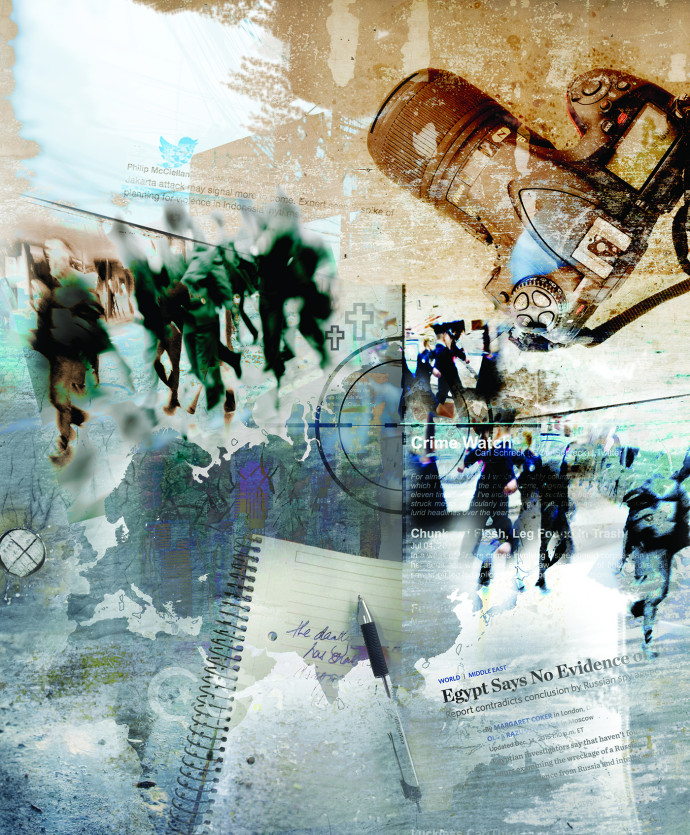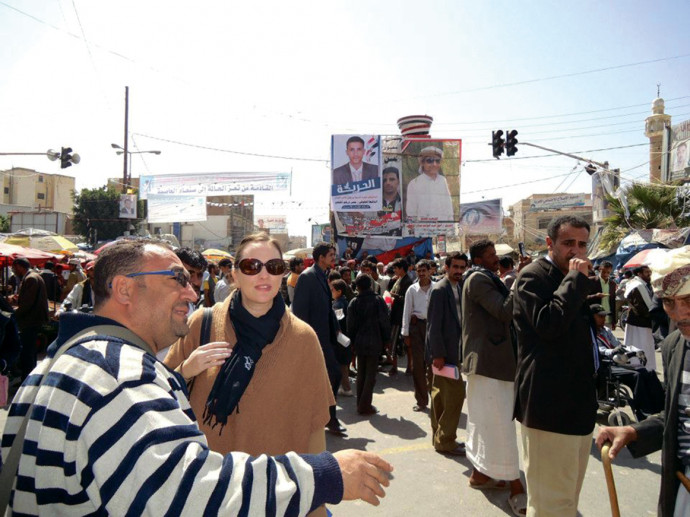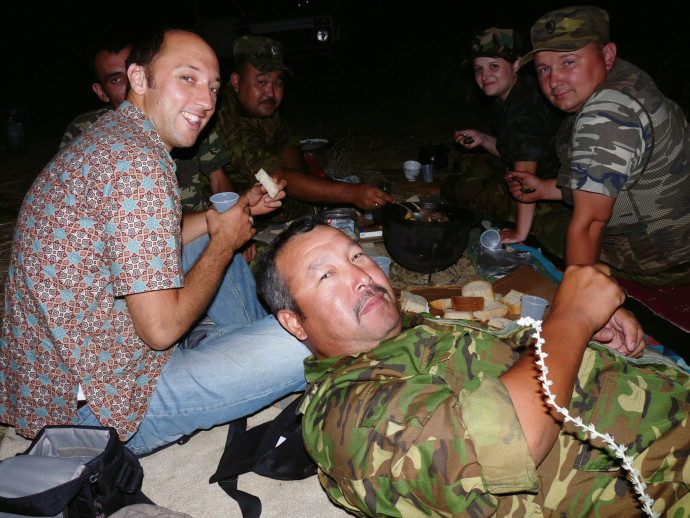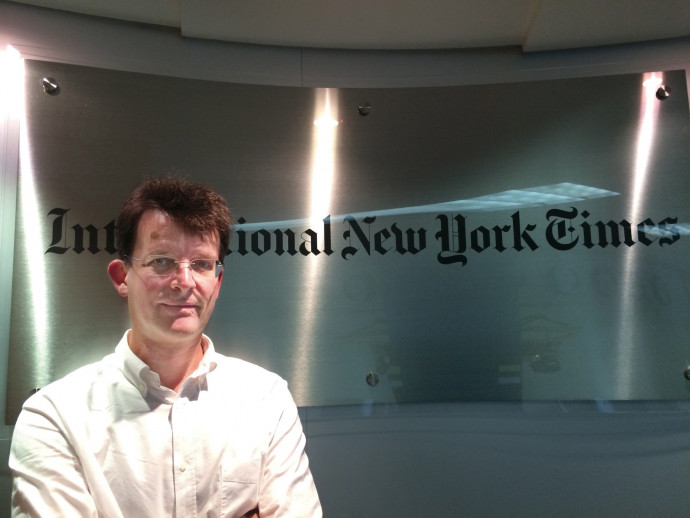Front-Page History
In their careers as international journalists, Lewis & Clark alumni often capture the first draft of history as events unfold.
by Romel Hernandez
illustration by Esther Bunning

On the evening of September 11, 2012, extremist militants attacked the U.S. diplomatic compound in Benghazi. Early the next morning, Margaret Coker BA ’93 received an urgent call from a source telling her the American ambassador to Libya had gone missing.
Starting to work the phones to reach her contacts, she soon confirmed that Ambassador J. Christopher Stevens, a friend for a decade, had been murdered in the attack. Coker, a senior correspondent for the Wall Street Journal, was soon packing her bag to fly from her home in Abu Dhabi to Libya. Within about 12 hours, she would be among the first Western journalists to report on the devastating scene in Benghazi.
But first she had to file an online video report for the Journal.
In the Skype video, her sadness is evident as she outlines what was known up to that point. When she starts talking about the notification of Stevens’ family of his death, she chokes up. “I’m sorry,” she says, wiping away tears. “It’s a hard day to be a journalist.”
Coker’s peripatetic career has put her in the middle of some of the most significant events of the past two decades. As a young reporter, she witnessed the relentless rise to power of Vladimir Putin in Russia. As bullets whizzed through the air, she filed dispatches from combat zones in Afghanistan and Iraq. She chronicled the pro-democracy uprisings of the Arab Spring. Now, based in London, she has made a career out of covering terrorism in one of the most violent and volatile regions in the world, the Middle East.
When major news breaks, journalists rush in to take on the challenge of compiling the first draft of history. Coker understands that privilege—and responsibility—as keenly as anyone in the trade.
“Since being abroad,” she says, “I’ve ridden this great wave of history in the making.”
The life of a foreign correspondent might seem glamorous—and at times, it may be—but that doesn’t make the work any easier. For Coker, the ambassador’s slaying was a stark reminder of the stakes involved. “Basically, I was there to investigate the murder of a friend,” she says. “You couldn’t help but lose a bit of objectivity. Yet I feel strongly we have a duty as journalists to tell the story.”
Although Lewis & Clark does not offer a journalism program, the campus is in many ways an ideal training ground for a career as a foreign correspondent. The college’s liberal arts focus nurtures students’ curiosity and social consciousness, along with cultivating essential skills in critical thinking and communication. In addition, Lewis & Clark is well known for its commitment to international education; for example, well over half of undergraduates participate in the college’s overseas study program. As a result, students end up with a deeper understanding of the challenges facing the world—the foundation of a successful career in journalism.
✦ ✦ ✦

In the early 1990s, as the communist society of the Soviet Union was becoming more open, Margaret Coker headed to Khabarovsk on an overseas study program.
She had grown up in a military family that thought of the Soviets as the enemy. As one of just a handful of Lewis & Clark students in that remote outpost beyond Siberia, she realized that Russians “weren’t caricatures, but real human beings.”
By the time she graduated in 1993, the Soviet Union had collapsed. Trading on her fluency in Russian—and her major in international affairs—she set her sights on working abroad. “I knew that was where I wanted to be,” she says. “It was just a matter of getting myself there.”
After landing an internship to teach in the former Soviet republic of Kazakhstan, she worked as a “stringer” reporter for the Associated Press. After a stint back in the States as a reporter in Washington, D.C., she moved back to Moscow with the online business news site MarketWatch.
Following 9/11, Coker, who was by then working for Cox Newspapers, was dispatched to Afghanistan to cover the U.S. invasion and spent most of the next few years reporting on the wars there and in Iraq. At one point, she was embedded with U.S. Marines during the notoriously bloody battle for Fallujah. Her reportage captured the ravages of combat in grim detail: “After the grind of gun battles, aerial assaults and tank and artillery fire, the city resembles a Hollywood set. In the morning, it is turned on for battle, and at night, the streets, choked with rubble and dotted with decaying corpses, are eerily silent. In some areas of the city, corpses lie on the street every 50 yards, rotting in the 85-degree heat.”
In 2008, Coker moved to the Wall Street Journal, covering the Middle East from Abu Dhabi. At the beginning of her tenure, she spent 70 percent of her time traveling to hotspots throughout the region. She considers reporting on the Arab Spring revolutions that swept the region in 2011 as a career milestone.
Coker travels far less today, focusing on in-depth investigations rather than breaking news. Nevertheless, she stays primed to drop everything and jet off at a moment’s notice, keeping her abaya, the cloak worn by Muslim women, as well as her body armor, at the ready in her closet.
“It’s a nomadic, nontraditional life,” she says, noting it helps that her husband is an editor for the Journal. “You absolutely must have that sense of adventure.”
✦ ✦ ✦
Carl Schreck BA ’98, a senior correspondent for Radio Free Europe/Radio Liberty, also got his start in Russia, though his journalism career has taken a different path.
A point guard for the Pioneer basketball team, he graduated with a degree in German and moved to Munich, where he had spent his junior year studying to work as a press assistant for the International Basketball Federation. After a brief return to Portland, where career opportunities were scant at the time in the wake of the dot-com bust, he jumped at a fellowship through the International Research and Exchanges Board to study and work in Moscow in 2000. He had already studied Russian while at Lewis & Clark, which helped prepare him for living there. “I thought I would stay a year, but I wound up staying for a decade,” he says. “It was an exciting place to land—really intense and dynamic.”
Schreck wrote freelance articles to make ends meet and was hired as a reporter at the Moscow Times, the country’s leading English-language daily newspaper. He covered sports and crime beats, writing about everything from chess tournaments to murders, eventually earning a promotion to news editor and, ultimately, managing editor. As a cub reporter, he covered some fairly gruesome crime stories, such as a piece about a wife who hired a hit man to kill her husband and cut off his nose as proof of the deed. He notes these events sometimes resembled “something out of a Dostoevsky or Gogol novel.”
The news cycle was fast-paced but energizing. “Covering hard news is a great way to cut your teeth in journalism,” he says. “Many days, I’d get handed a story and would be expected to be an expert on the topic within a few hours in order to churn out insightful, accurate, readable copy.”

He moved back to the States in 2010, freelancing and taking on editing jobs in New York and Washington, D.C. Two years ago, he assumed his current position as senior correspondent for Radio Free Europe/Radio Liberty, continuing to write and edit—mainly for the web—about Russia and the countries of the former Soviet Union.
Despite his hard-news roots, Schreck gravitates toward offbeat human-interest stories, penning pieces on billionaires and dissidents, mobsters and musicians. He’s written on subjects ranging from road rage in Moscow (for the Nation) to marijuana trafficking in Kazakhstan (for High Times). During the latter, he endured a bone-rattling car ride through the steppes with drug police doing a sweep that netted a bedraggled pair of migrant workers with 500 kilos of pot: “I had to avert my eyes as the suspects were peppered with questions, so depressing was the scene … ‘They live short lives,’ the border guard told me grimly.”
Although he has lived the past six years stateside (two years in New York City and four years in Washington, D.C.), in many ways, his heart is still back in Russia. “Russia is an exciting place where things are wide open and changing constantly,” Schreck says. “It’s just bursting with crazy stories.”
✦ ✦ ✦
Philip McClellan BA ’91 keeps tabs on the world as the international weekend editor at the New York Times, a job that involves choosing “all the news that’s fit to print” as reported by the newspaper’s vast network of staff and stringers across the globe.
“It’s amazing getting to watch what’s unfolding in the world,” he says. “Just when you think things are pretty quiet, something major happens in Mexico or Syria or elsewhere. I love working here as part of such a huge operation with so many journalists doing so much incredibly important work.”
McClellan was a Third Culture Kid (TCK), growing up in Singapore, Hong Kong, and Geneva as the son of an American professor father and a German journalist mother. Even though he was born in Wisconsin, he felt like a foreigner when he arrived as a first-year student at Lewis & Clark. Although he did not study overseas during his undergraduate years as a history major, he always aimed to return to Asia.
He started out as a reporter in Hong Kong and later worked out of Bangkok for Agence France-Presse. He covered stories ranging from the Cambodian peace process, aimed at ending decades of war and strife, to the Myanmar government’s persecution of Nobel Peace Prize recipient Aung San Suu Kyi. “It was an exciting time and place,” he says of his mid-’90s work in Myanmar. “You always assumed military intelligence was watching you.”
After a few years back in the U.S. as an editor for the San Jose Mercury News, McClellan moved overseas again to work for the International Herald Tribune (since renamed the International New York Times) as an editor in Paris and Hong Kong. He preferred shaping “big-picture” news coverage as an editor to reporting. He helped grow the paper’s Asia edition and spearheaded coverage of major events, such as the Indian Ocean tsunami that killed more than 230,000 people in 2004 and the Japanese earthquake that triggered the nuclear disaster in Fukushima in 2011: “Suddenly, things went crazy in the office as we made preparations to cover the Fukushima story,” he recalls. McClellan took charge of mobilizing reporters and photographers to reach the remote region and kept the Times foreign editor back in New York apprised of the situation around the clock.

In 2014, McClellan moved to New York to work at the paper’s headquarters, where he coordinates the international report on Sundays and Mondays. He juggles near-constant web and print deadlines while working with reporters to prioritize breaking news coverage. A single recent weekend included articles datelined Australia, Afghanistan, Saudi Arabia, China, Germany, Argentina, Great Britain, France, North Korea, Belgium, Pakistan, Egypt, Russia, Chad, Macedonia, Indonesia, Peru, Brazil, India, and the Philippines. On top of the heavy workload is the pressure that comes from knowing the Times’ every move is under scrutiny. “You’re going nonstop,” McClellan says. “You definitely need good instincts.”
✦ ✦ ✦
Notably, neither Coker, Schreck, nor McClellan wanted to be a reporter when they grew up, and they didn’t write for Lewis & Clark’s student newspaper, the Pioneer Log.
Instead, they were drawn to journalism as a way to travel and see the world, and chanced into jobs that turned into vocations.
And that is where their education and experiences at Lewis & Clark played such an important role in their career choices.
“Lewis & Clark, including my year in Germany, ignited my interest in working abroad,” Schreck says, “and served me very well in journalism.”
“Journalism is a profession in which you need to think clearly and critically, ask questions, and be able to put together a sentence,” Coker says. “I’ve never taken a journalism class. You have to be interested in how the world works, and that’s what a liberal arts education teaches you.”
Although serendipity may have led them to journalism, it’s a career they take seriously. They don’t come across as the stereotypically hard-bitten, world-weary journalists. They are committed to telling compelling stories of people and places their readers may never meet or see firsthand.
“The world is moving and changing at such a breakneck speed, it can be hard to understand what is really going on,” McClellan says. “In many ways, the most fulfilling part of the job isn’t covering the big breaking story, but chronicling incremental changes over time.”
That’s why truly great journalism isn’t just about reporting a story; it’s about how the story gets told.
Despite a career spent reporting on tough, tragic situations, Coker hasn’t lost her sense of compassion. She can distinguish between types of artillery by their noise on approach and has trained herself not to flinch at explosions or scenes of mayhem, but she can still be moved by tragedy.
“You can recite the facts, but when you lose your sensitivity, you lose your power,” she says. “I know some journalists are jaded, and I think it’s a shame. I feel strongly that people around the world deserve to have their stories shared, and we, as journalists, have a duty to tell those stories.”
Romel Hernandez is a freelance writer in Portland.
More L&C Magazine Stories
Lewis & Clark Magazine is located in McAfee on the Undergraduate Campus.
MSC: 19
email magazine@lclark.edu
voice 503-768-7970
fax 503-768-7969
The L&C Magazine staff welcomes letters and emails from readers about topics covered in the magazine. Correspondence must include your name and location and may be edited.
Lewis & Clark Magazine
Lewis & Clark
615 S. Palatine Hill Road MSC 19
Portland OR 97219

